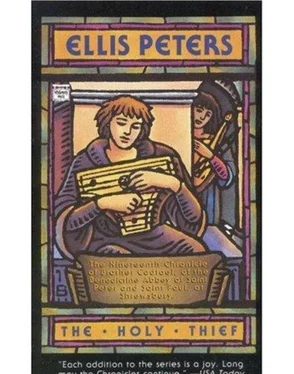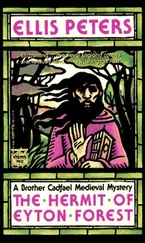“I will also speak to my brother,” Sulien pursued earnestly, “and see what more we may be able to do. They are cutting coppice-wood, there will be older stands well seasoned. And they are taking out some wellgrown trees from the woodland. I will ask him for a load of timber for your rebuilding, and I think he will let me have it. I am asking no other portion before I go into the king’s service at Shrewsbury. If the abbey can supply a cart to transport it, or one can be hired? Eudo’s carts cannot be spared for so long.”
This practical offer Herluin received with more warmth. He was still resentful, Cadfael thought, of his failure to overwhelm all argument and take the backslider home with him, not for the promised month, but for life. Not that Sulien himself was of such great value, but Herluin was not accustomed to being so stoutly resisted. All barricades should have fallen like the walls of Jericho at the blast of his trumpet.
Still, he had extracted all he could, and prepared to take his leave. Tutilo, all attentive ears and modestly lowered eyes in his corner, opened the chest quietly, and laid away the psaltery he had been clasping to his heart. The very gentleness with which he laid it within and slowly closed the lid over it brought a small, thoughtful twist to Donata’s ashen mouth.
“I have a favour to ask,” she said, “if you will hear it. Your songbird here has given me delight and ease. If I am sometimes sleepless and in pain, will you lend me that consolation for an hour, while you remain in Shrewsbury? I will not send unless I need him. Will you let him come?”
If Herluin was taken aback at such a request, he was nevertheless shrewdly aware that she had him at a disadvantage, though in all probability, thought Cadfael, interested, he was hoping that she was less aware of it. In which hope he was certainly deluded. She knew very well he could hardly refuse her. To send a susceptible novice to provide music for a woman, and a woman in her bed, at that, was unthinkable, even scandalous. Except that this woman was now so closely acquainted with death that the subtle creaking of the opening door was present in her voice, and the transparent pallor of the bodyless soul in her face. She was no longer responsive to the proprieties of this world, nor afraid of the dread uncertainties of the next.
“Music medicines me to peace,” she said, and waited patiently for his submission. And the boy in the corner stood mute and passive, but beneath the long, lowered lashes the amber-gold eyes glowed, pleased, serious and wary.
“If you send for him in extreme need,” said Herluin at last, choosing his words with care, “how can our Order reject such a prayer? If you call, Brother Tutilo shall come.”
“NO QUESTION NOW how he got his name,” said Cadfael, lingering in Brother Anselm’s workshop in the cloister after High Mass next morning. “Sweet as a lark.” They had just heard the lark in full song, and had paused in the precentor’s corner carrel to watch the worshippers disperse, the lay visitors from the guesthall among them. For those who sought lodging here it was politic and graceful, if not obligatory, to attend at least the main Mass of the day. February was not a busy month for Brother Denis the hospitaller, but there were always a few travellers in need of shelter.
“The lad’s immensely talented,” agreed Anselm. “A true ear and an instinct for harmony.” And he added, after a moment’s consideration: “Not a voice for choral work, however. Too outstanding. There’s no hiding that grain among a bushel.”
No need to stress the point, the justice of that verdict was already proved. Listening to that pure, piercingly sweet thread, delivered so softly, falling on the ear with such astonishment, no one could doubt it. There was no way of subduing that voice into anonymity among the balanced polyphony of a choir. Cadfael wondered if it might not be equally shortsighted to try and groom its owner into a conforming soul in a disciplined brotherhood.
“Brother Denis’s Provencal guest pricked up his ears,” remarked Anselm, “when he heard the lad. Last night he asked Herluin to let the boy join him at practice in the hall. There they go now. I have his rebec in for restringing. I will say for him, he cares for his instruments.”
The trio crossing the cloister from the south door of the church was a cause of considerable curiosity and speculation among the novices. It was not often the convent housed a troubador from the south of France, obviously of some wealth and repute, for he travelled with two servants and lavish baggage. He and his entourage had been here three days, delayed in their journey north to Chester by a horse falling lame. Rémy of Pertuis was a man of fifty or so, of striking appearance, a gentleman who valued himself on his looks and presentation. Cadfael watched him cross towards the guesthall; he had not so far had occasion to pay him much attention, but if Anselm respected him and approved his musical conscience he might be worth studying. A fine, burnished head of russet hair and a clipped beard. Good carriage and a body very handsomely appointed, fur lining his cloak, gold at his belt. And two attendants following close behind him, a tall fellow somewhere in his mid-thirties, all muted brown from head to foot, his good but plain clothing placing him discreetly between squire and groom, and a woman, cloaked and hooded, but by her slender figure and light step young.
“What’s his need for the girl?” Cadfael wondered.
“Ah, that he has explained to Brother Denis,” said Anselm, and smiled. “Meticulously! Not his kin...”
“I never thought it,” said Cadfael.
“But you may have thought, as I certainly did when first they rode in here, that he had a very particular use for her, as indeed he has, though not as I imagined it.” Brother Anselm, for all he had come early to the cloister, had fathomed most of the byways that were current outside the walls, and had long ago ceased to be either surprised or shocked by them. “It’s the girl who performs most of his songs. She has a lovely voice, and he values her for it, and highly, but for nothing else, so far as I can see. She’s an important part of his stock in trade.”
“But what,” wondered Cadfael, “is a minstrel from the heart of Provence doing here in the heart of England? And plainly no mere jongleur, but a genuine troubadour. He’s wandered far from home, surely?”
And yet, he thought, why not? The patrons on whom such artists depend are becoming now as much English as French, or Norman, or Breton, or Angevin. They have estates both here and oversea, as well seek them here as there. And the very nature of the troubadour, after all, is to wander and venture, as the Galician word trobar, from which they take their name, though it has come to signify to create poetry and music, literally means to find. Those who find, seek and find out the poetry and the music both, these are the troubadours. And if their art is universal, why should they not be found everywhere?
“He’s heading for Chester,” said Anselm. “So his man says, Bénezet, he’s called. It may be he hopes to get a place in the earl’s household. But he’s in no haste, and plainly in no want of money. Three good riding horses and two servants in his following is pretty comfortable travelling.”
“Now I wonder,” said Cadfael, musing darkly, “why he left his last service? Made himself too agreeable to his lord’s lady, perhaps? Something serious, to make it necessary to cross the sea.”
“I am more interested,” said Anselm, undisturbed by such a cynical view of troubadours in general, “in where he got the girl. For she is not French, not Breton, not from Provence. She speaks the English of these borders, and some Welsh. It would seem she is one property he got this side the ocean. The groom, Bénezet, he’s a southerner like his master.”
Читать дальше












